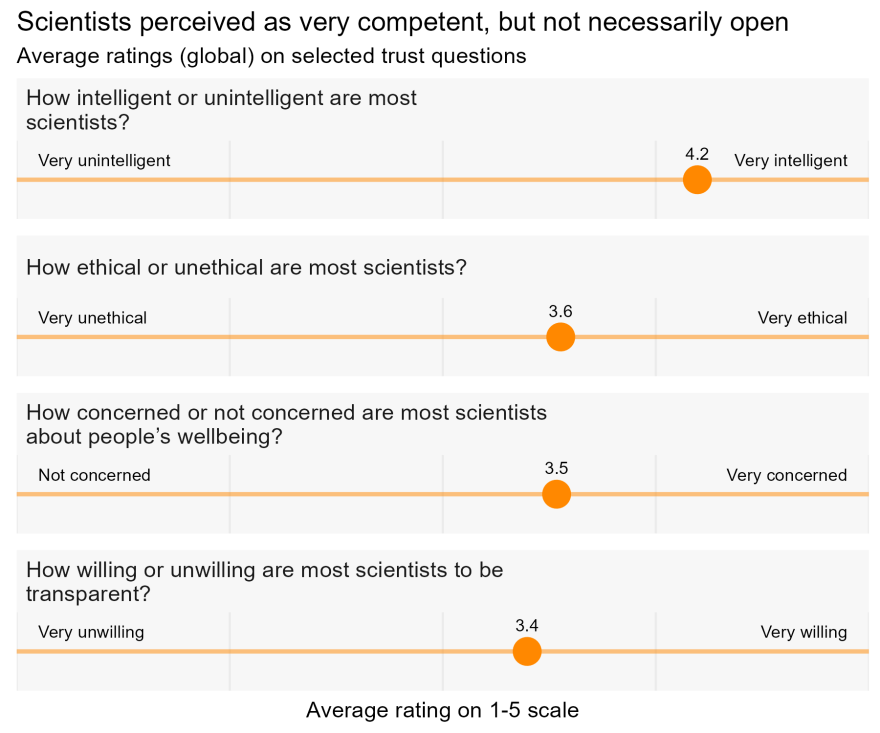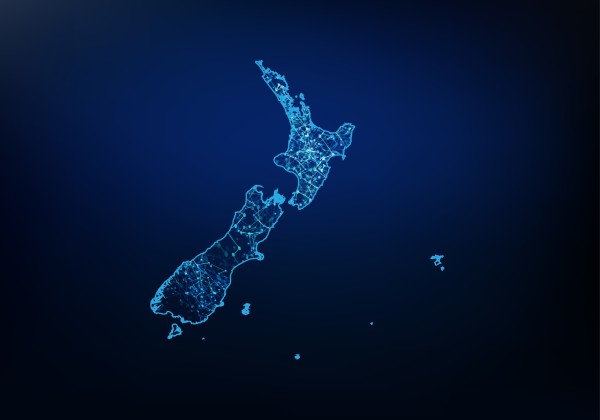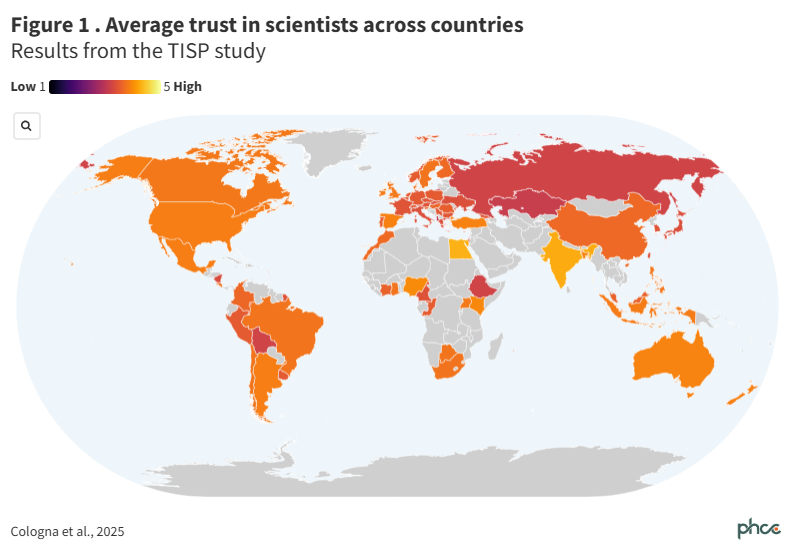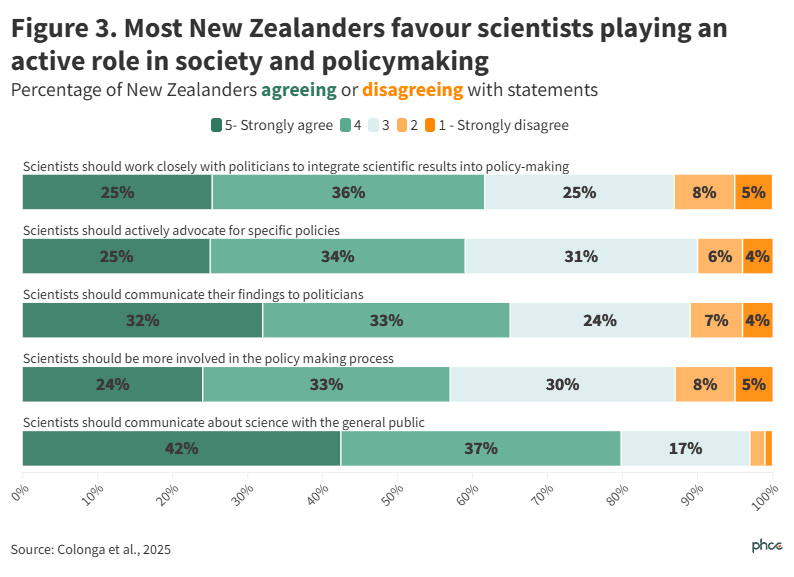Summary
A global survey highlights that New Zealanders place strong trust in science—ranking highly among the 68 countries surveyed—and counters global concerns about declining confidence in expert knowledge.
The findings show that most people in New Zealand value scientific expertise and recognise its role in solving major societal issues, including public health challenges.
The high level of trust reported globally should not be taken for granted. The scientific community must maintain transparent communication and public engagement and strive to demonstrate trustworthiness.
Five years since the start of the COVID pandemic, it can feel as if trust in the knowledge of experts and scientific evidence is in crisis.
But according to our new findings in a global survey1 of more than 70,000 people across 68 countries (including more than 2,000 New Zealanders surveyed early in 2023), people hold science in high regard and want scientists to be more involved in policy decisions (Figure 1).
New Zealanders are particularly trusting of scientists, ranking ninth internationally, not far behind Australians who ranked fifth.
Strikingly, despite concerns about a crisis of trust both overseas and in Aotearoa New Zealand (NZ), no country shows low trust in science.
This comprehensive international survey is the largest international study examining trust in science and scientists since the COVID pandemic. It extends its reach beyond typically studied nations to those that have been largely underrepresented in research.
For NZ, it highlights key views on scientists and their role in society, and how these perceptions compare to other countries.
Why should we care about trust in science?
In our daily lives, we are constantly having to make decisions that involve scientific evidence. Should I get my infant vaccinated? Do I need to wear sunscreen? Should I be drinking this much coffee?
What we choose to do is influenced by what we believe and who we trust. If we want people to make decisions informed by evidence, we need people to trust science.
Tackling some of the biggest issues of today can be done more effectively when the public trust in science. For example, countries with higher trust in science were more supportive of public health measures such as mandatory face masks in public to prevent COVID infection.2 People with higher trust in science also engage in more behaviours to mitigate climate change.3
Of course, we shouldn’t promote blind trust in science. There is a very real need for scepticism, criticism and scrutiny of science. But governments need people to trust science if they are to have evidence-based policy. And scientists need people to trust science if their research is to get support and funding.
Breaking down trust in science
This new survey corroborates previous research that finds New Zealanders are trusting of scientists.2 But what do we even mean by “trusting scientists”?
In this research, trust was broken down into four separate, but related parts: competence, benevolence, integrity and openness.
Globally, people are particularly trusting of the competence of scientists (78% believe scientists are qualified to conduct research), moderately trusting of the benevolence and integrity of scientists (57% believe most scientists are honest) but less trusting of the openness of scientists to feedback (42% believe scientists pay attention to others’ views). Average responses to some of our trust questions are shown below in Figure 2.
Figure 2. Trust ratings

Source. Mede et al., 20254
Although this research doesn’t point to a crisis of trust in science, we shouldn’t ignore the concerns of those who don’t trust science or minimise the disproportionate effect opinions of a minority can have in society.5
Vocal and influential voices who distrust science may have very real impacts on the role scientific evidence plays in policy and in society.
Who is more, or less trusting of science?
Globally, people were more likely to trust science if they were female, older, more educated, had a higher income, lived in an urban setting, were religious and politically liberal. However, this varied by country.
At odds with what might feel intuitive, most counties showed either no or only a very small relationship between tertiary education and trust in science.
In NZ, people who reported being more religious or earning higher incomes expressed greater trust in science, whereas education appeared unrelated. Likewise, Australians on higher incomes and stronger faith expressed higher trust in science, but people with higher levels of tertiary education also reported slightly greater trust.
In many countries, including NZ and Australia, peoples’ self-reported political ideology – being more “liberal” or “conservative” on the political spectrum – was not significantly related to trust in science.
A clear exception to this was the US, where some science-related issues such as climate change and healthcare have become heavily politicised. Americans with more conservative political views tended to express lower trust in science.
The overall impact of demographic variables on trust in science was small. Demographic factors should not be seen as the driving force of whether people trust science and scientists, but merely a small piece of the puzzle.
One factor that showed a stronger relationship (both globally and in NZ) to whether people trust science is how much a person endorsed social hierarchy – the idea that some groups in society dominate others.
People who showed a greater preference for hierarchy expressed lower trust in science. This could be due to a perception that scientific research aims to reduce inequalities or challenges existing hierarchies and the status quo.6
Public health a priority
When asked about the goals science should prioritise, most New Zealanders agreed that research should focus on improving public health (84%), solving energy challenges (76%), and reducing poverty (66%). However, fewer respondents felt that science currently prioritizes these areas (65%, 62%, and 38%, respectively, strongly or very strongly believed that science aims to tackle these goals).
Science and society
Our study clearly showed that New Zealanders want scientists to be engaged with society and politics. More than half of New Zealanders believed that scientists should be more involved in the policy-making process, communicate their findings to politicians, work with politicians to integrate scientific results into policy making and advocate for specific policies.
An overwhelming 79% of New Zealanders (83% of people globally) believed scientists should communicate about science with the general public.
Despite some publicised pushback against science during the pandemic, this new research shows most New Zealanders trust science and New Zealand ranks highly in global terms. However, this trust should not be taken for granted by the scientific community.
Scientists and scientific organisations must strive to demonstrate their trustworthiness. This includes ensuring they act honestly and transparently. And that they listen to and work with the people who are affected by their research. Trust is fragile – hard to earn and easy to lose.
What this study adds
- A new global study finds people in most countries, including NZ, hold science in high regard and want scientists to be more involved in policy decisions.
- Both global and NZ results show the public believes public health should be considered a priority area for scientific research
Implications for policy and practice
- Research should strive to maintain public trust through transparency and two-way dialog with stakeholders, including policymakers and the wider public.
The TISP initiative has developed a data visualisation dashboard where users can explore the data and compare across countries.![]()
Author details
Laura Kranz, Assistant Lecturer in Science in Society, Te Herenga Waka — Victoria University of Wellington
Dr John Kerr, Senior Research Fellow, Department of Public Health, University of Otago, Wellington
This article is republished, with adaption, from The Conversation under a Creative Commons license. Read the original article.



